Personal reference letter template for housing
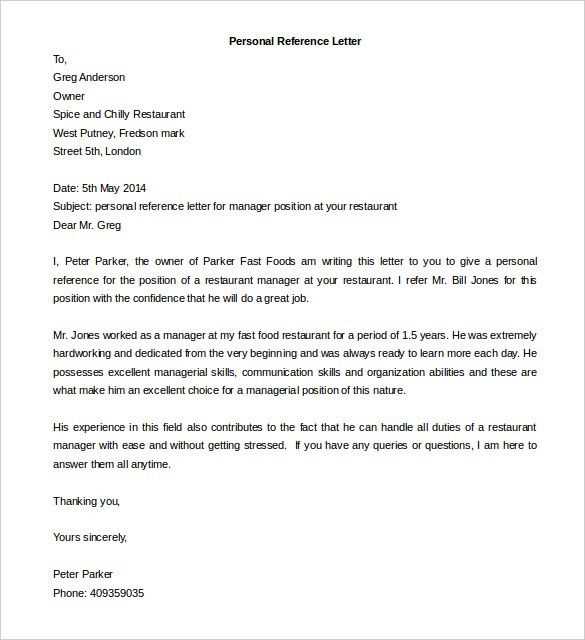
Provide your prospective landlord with a letter that highlights your reliability as a tenant. A well-crafted personal reference letter can go a long way in securing the housing you want. The letter should offer concrete examples of your character, financial stability, and past experiences in rental settings.
Start by introducing the relationship you have with the tenant, including the length of your acquaintance and the context in which you know them. Mention any relevant qualities that demonstrate their responsibility, trustworthiness, and respect for property. For instance, note their punctuality in payments, their ability to follow house rules, or how they maintain their living space.
Next, include specific details that show the tenant’s consistency and dependability. If they have been a long-term renter, emphasize their track record of good behavior and stability. If they’ve handled issues or emergencies well, provide examples that reassure the landlord of their capacity to manage unexpected situations.
Conclude the letter by clearly recommending the tenant for the rental. Offer to be available for further contact if the landlord needs additional information. Keep the tone warm, but professional, to make the recommendation genuine and impactful.
Here’s the revised version:
To create a strong personal reference letter for housing, be specific about your relationship with the individual and provide clear examples of their reliability and character. Highlight positive qualities such as responsibility, punctuality, and respect for others. Mention any relevant experience or context that shows they would be a good fit for the housing arrangement. Focus on details that reflect the person’s ability to maintain a positive living environment. Avoid vague phrases or general statements that don’t add weight to the reference.
Key Points to Include:
Start with a brief introduction, stating how long you’ve known the person and in what capacity. Provide concrete examples of their reliability–whether it’s paying rent on time, maintaining a clean living space, or respecting neighbors. If applicable, mention their involvement in the community or any other qualities that could strengthen their candidacy. Be honest about any potential challenges, but frame them in a way that highlights their growth and commitment to improvement.
- Personal Reference Letter Template for Housing
When writing a personal reference letter for housing, focus on specifics that highlight reliability, responsibility, and suitability for renting. Start with your relationship to the tenant, explaining how long you’ve known them and the nature of your connection. Mention the tenant’s qualities that make them a good candidate for a rental, such as punctuality in paying bills or maintaining a clean living space.
Describe their behavior in detail, emphasizing their respect for property, quietness, and ability to follow rules. You can also address how they handle conflicts or communicate with others, as these traits are important to landlords. Conclude by reaffirming your support for their application, stating that you would gladly have them as a tenant again.
Here’s a simple structure to follow:
- Your name, position, and contact information
- Introduction: how long you’ve known the tenant
- Positive qualities and specific examples
- Conclusion: strong recommendation and contact availability
Keep the tone professional, but personal enough to show genuine support for the tenant. Avoid unnecessary embellishments and stick to the facts that will reassure the landlord about the applicant’s reliability and character.
Begin with a brief introduction that clearly identifies your relationship to the person being recommended. Mention how long you have known them and in what capacity. Be specific–if you worked together, say so. This sets the context for the reader and establishes your credibility as a reference.
State Your Purpose Clearly
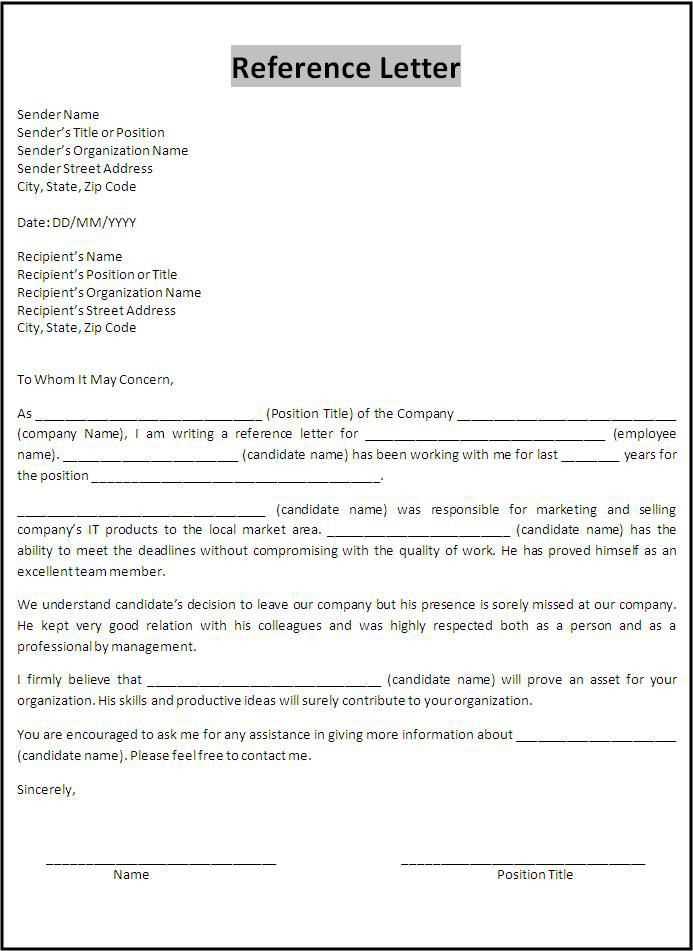
In the first paragraph, immediately state that you are writing a recommendation letter and explain why you are endorsing the person. Highlight the main qualities you believe make them suitable for the housing opportunity. Be honest and focus on attributes that directly relate to the potential tenant’s ability to maintain a property, interact with neighbors, and meet financial responsibilities.
Provide Specific Examples
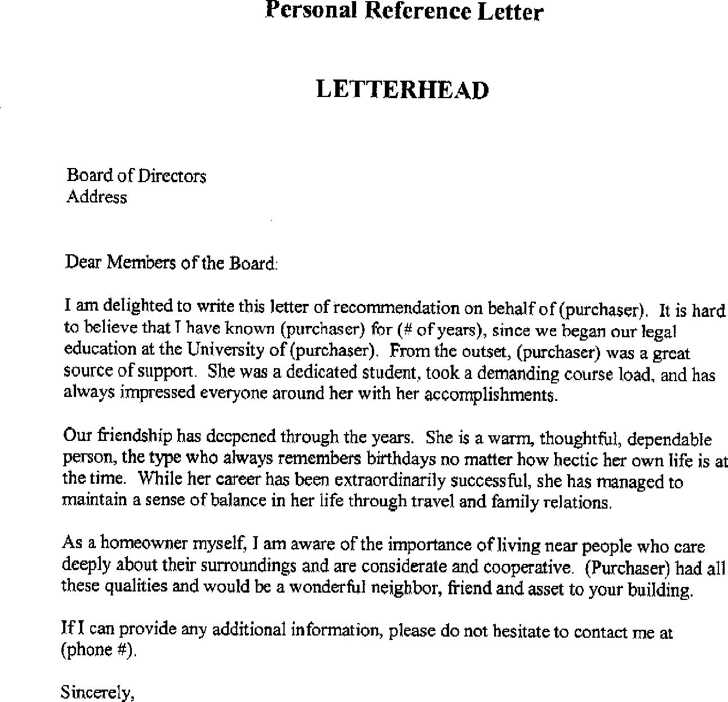
Use the middle paragraph(s) to describe specific incidents or experiences that demonstrate the person’s strengths. These can include reliability, responsibility, or how they handle challenges. Personal anecdotes that reveal their character are more impactful than abstract descriptions. For instance, mention how they’ve been punctual with rent payments or have kept the property in good condition if you have relevant examples.
End with a strong, positive closing statement. Summarize your confidence in the person’s ability to meet the demands of the housing opportunity. Offer to provide further information if necessary, and include your contact details to reinforce your availability for follow-up questions.
Specify the relationship between the writer and the tenant. Clearly state how long you have known the person and in what capacity. For example, mention if they were a neighbor, colleague, or tenant under your management. This adds context to your observations.
Contact Information
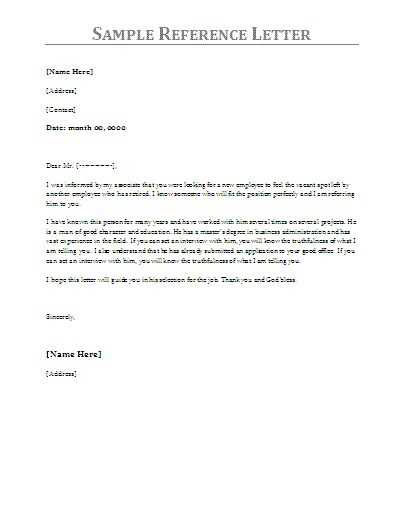
Include both your name and contact details. Make sure the recipient can reach you if they need further clarification. This demonstrates transparency and openness in the reference.
Character and Reliability
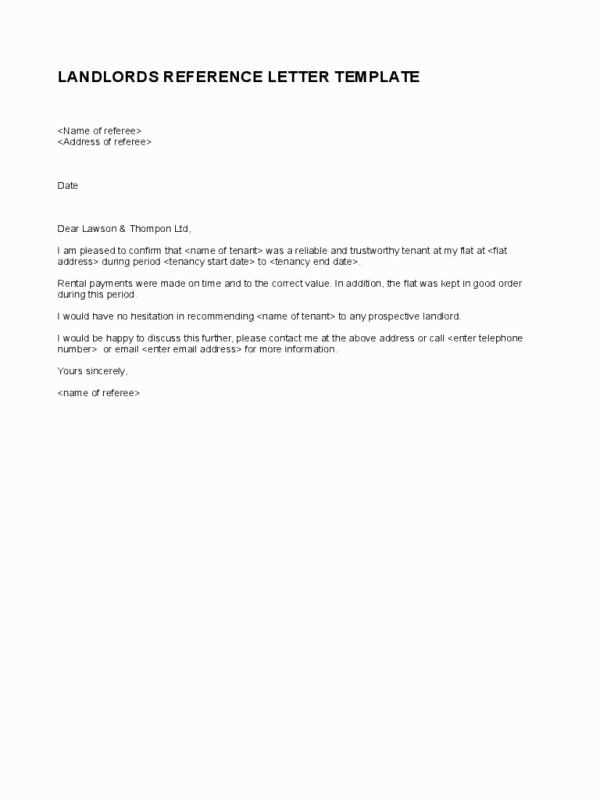
Describe the tenant’s character and reliability. Highlight aspects like punctuality with rent payments, general behavior, or how they maintain the property. Use specific examples to back up your claims, as this helps the recipient assess the tenant’s suitability more accurately.
Begin by being specific about the individual’s character and qualities. Highlight attributes such as reliability, trustworthiness, and respectfulness, providing real-life examples. Share specific instances where the person demonstrated these traits, whether in a professional or personal context.
Keep your tone friendly yet formal. Acknowledge the individual’s strengths without exaggerating. Aim for a balance between praise and honesty, ensuring the letter feels authentic. This builds credibility and assures the reader that the reference is genuine.
Use clear and direct language. Avoid overly complex sentences that may distract from your message. A simple and straightforward approach is the most effective when presenting the person’s qualities.
Tailor the letter to the specific housing situation. Mention any relevant experiences, such as the individual being a responsible tenant or a considerate neighbor. Connect these experiences directly to the qualities that make them an ideal candidate for the housing opportunity.
End the letter by offering your continued support. Let the recipient know you are happy to provide further details if needed. This shows your willingness to stand by your recommendation, adding an extra layer of trust.
Begin by using a formal salutation, such as “Dear [Landlord’s Name]” or “To [Property Owner’s Name].” If you don’t know their name, a respectful option is “Dear Sir/Madam” or “To Whom It May Concern.” Always try to address the person by name if possible; it adds a personal touch and shows attentiveness. Avoid generic greetings like “Hello” or “Hi,” which may come across as too casual for a formal request.
Next, when addressing a group of property owners or a company managing the property, use “Dear [Company Name]” or “To the [Company Name] Team.” Be specific and professional in your approach, keeping the tone respectful throughout the letter.
Ensure that the title or form of address aligns with the person’s position, whether it’s “Mr.,” “Ms.,” or “Dr.” If you’re unsure, using the more neutral “Dear [Full Name]” works as a safe choice.
- Always double-check spelling of the name or title.
- Use appropriate honorifics for respect, if applicable.
- If unsure, keep it formal to maintain professionalism.
Avoid being too vague when writing a recommendation letter. Specific examples of the candidate’s character or actions are more convincing than general statements. For instance, instead of saying “She is a great person,” describe an instance where her actions displayed strong qualities such as leadership or reliability.
Don’t exaggerate the candidate’s abilities. Be truthful and focus on their strengths without overstating them. Providing clear, measurable examples ensures credibility and makes your recommendation more valuable.
Avoid focusing too much on personal relationships. While mentioning a personal connection can be helpful, it’s essential to prioritize the candidate’s qualifications and how they are relevant to the housing situation. Avoid making the letter seem like a casual favor.
Watch out for spelling and grammatical mistakes. These errors can undermine the seriousness of your recommendation. Always proofread the letter or have someone else check it before sending.
Avoid being overly formal or too casual. The tone should strike a balance–professional but approachable. A recommendation letter that feels too stiff might seem insincere, while one that’s too casual might lack the necessary gravity.
Be concise and direct. Lengthy, unfocused letters may confuse the reader. Stick to the key points and keep your message clear and to the point.
| Error Type | Impact | Solution |
|---|---|---|
| Vague Statements | Weakens the recommendation | Provide concrete examples |
| Exaggeration | Reduces credibility | Be truthful and balanced |
| Too Personal | May seem inappropriate for a professional letter | Focus on qualifications relevant to the housing situation |
| Grammatical Errors | Can appear unprofessional | Proofread thoroughly |
| Inappropriate Tone | May seem insincere or unprofessional | Maintain a balanced, professional tone |
| Excessive Length | Reduces impact and clarity | Be concise and focused |
A clear and concise personal reference letter highlights the candidate’s qualities and suitability for housing. Here’s a practical example to guide your writing:
Sample Personal Reference Letter
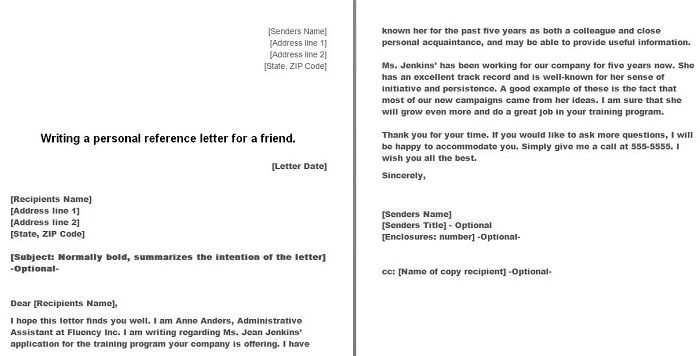
[Your Name]
[Your Address]
[City, State, ZIP Code]
[Email Address]
[Phone Number]
[Date]
[Landlord’s Name]
[Landlord’s Address]
[City, State, ZIP Code]
Dear [Landlord’s Name],
I am writing to provide a reference for [Candidate’s Name], who is applying for the [Property Address] rental. I have known [Candidate’s Name] for [X years/months] and have had the pleasure of working with them during this time.
[Candidate’s Name] has demonstrated excellent responsibility and reliability. They have always maintained a high standard of professionalism and respect towards others. In my experience, they are prompt with payments, conscientious about their commitments, and always communicate effectively. I am confident that [Candidate’s Name] will take great care of the property and be a respectful tenant.
If you require further information or would like to discuss this recommendation in more detail, feel free to contact me at [Your Phone Number] or [Your Email Address].
Sincerely,
[Your Name]
Key Points for Writing a Personal Reference Letter
- Include personal details and contact information at the top of the letter.
- Specify the duration and nature of your relationship with the candidate.
- Highlight the candidate’s key qualities relevant to tenancy, such as reliability and responsibility.
- Offer availability for further communication.
- Maintain a polite, professional tone throughout the letter.
When writing a personal reference letter for housing, start with a concise and clear introduction. State how long you’ve known the person and in what capacity, making it clear that you’re able to vouch for their character and suitability as a tenant.
Be specific about the qualities that make the individual a reliable candidate. Mention their responsibility, punctuality in payments, respect for property, and ability to maintain a tidy living environment. Include any relevant personal experiences that demonstrate these traits.
Conclude the letter by offering your strong recommendation. Keep the tone warm but professional, and provide your contact information for any follow-up questions. A personal reference should be both trustworthy and straightforward, showcasing the individual’s strengths without exaggeration.